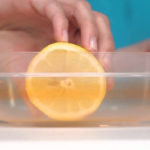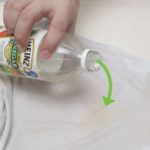1. Rinse berries with diluted vinegar:
-55402/biquyetbaoquan.jpg)
When you buy berries like strawberries, raspberries, blueberries…you should rinse them with a mixture of vinegar and water (in a ratio of 1:3). Then, rinse them again with water and let them dry completely. This mixture helps clean and prevent mold while extending their shelf life for up to a week.
2. Wrap celery, lettuce in paper towel:
-55402/biquyetbaoquan.jpg)
If you have bought too much celery for a salad, don’t worry! Store the remaining stalks in a bowl or a sealed container and place a piece of paper towel on top. Then, cover the lid or wrap the container tightly with plastic wrap. The paper towel will absorb the moisture that causes the leaves to wilt and discolor. Remember to replace the paper towel when it becomes damp!
3. Apply lime juice on avocados:
-55402/biquyetbaoquan.jpg)
Avocados contain enzymes that produce a brown pigment when exposed to oxygen, which is why they quickly wither and lose their vibrant color after being cut. To prevent this, sprinkle some lime juice on them or rub a piece of lime directly on the surface of the fruit. The citric acid helps prevent the avocado from browning for at least a day.
-55402/biquyetbaoquan.jpg)
You can also store sliced avocados with thinly sliced onions. The gases that make your eyes tear when cutting onions also prevent the oxidation process of avocados in a similar way. Don’t worry, the onions will only touch the outer part of the avocado, so they won’t significantly affect its taste.
4. Store carrots in water:
-55402/biquyetbaoquan.jpg)
To prevent carrots from wilting, choose ones with intact green tops (the leaves can “pull” nutrients out of the roots). Carrots are best stored in a humid environment, so place them in a container filled with water, cover the lid or wrap it tightly with plastic wrap, and store it in the refrigerator. If you don’t want to soak the carrots in water, you can wrap them in a damp paper towel. This method helps maintain moisture for fresh and crispy carrots, but the storage period will be shorter compared to soaking in water.
5. Don’t cut lemons in half:
-55402/biquyetbaoquan.jpg)
If you only need a small amount of citrus juice for your recipe without wasting the whole fruit, pierce a few holes in the lemon using a fork or a food pick instead of cutting it in half. This way, you can squeeze out the desired amount of juice without wasting the entire lemon.
6. Wrap onions in stockings, mesh:
-55402/biquyetbaoquan.jpg)
It may sound strange, but thin mesh materials like stockings or mesh bags provide enough air circulation for vegetables while maintaining favorable storage conditions, helping to keep them fresh. Simply put the onion in a stocking, tie a knot between each bulb. But a small tip is to use a new pair of stockings instead of old ones if you don’t want the smell of feet to seep into the food.
7. Store potatoes together with apples:
-55402/biquyetbaoquan.jpg)
Apples produce ethylene gas which can help potatoes stay fresh for over eight weeks. Now you don’t have to worry about potatoes sprouting if you store them for too long!
8. Soak sliced apples in saltwater:
-55402/biquyetbaoquan.jpg)
Sliced apples are ideal for mixing into salads or as a delicious snack. However, they quickly turn brown and lose their appeal. Soak the remaining apple slices in a bowl of cold saltwater to prevent oxidation (but no more than ½ teaspoon of salt per liter of water). After five minutes, remove the apple slices, drain or pat them dry, and place them in a container or bag, then store them in the refrigerator.
9. Wrap celery with aluminum foil:
-55402/biquyetbaoquan.jpg)
Unlike regular plastic bags, wrapping celery in aluminum foil allows the hot ethylene gas to easily escape. The trapped ethylene gas in plastic bags is the cause of moisture loss and faster spoilage.
I hope with these tips, you will know how to preserve fruits and vegetables fresh without worrying about spoilage.
You may also like
More Useful Advice for Homemakers (Part 2)
Have you heard of the surprisingly easy tips to make cooking and household chores simpler? White radish eliminates the acrid taste of salted meat, adding alum to raw shrimp helps soften it, and adding cold water when frying eggs can make them crispy – these are just a few of the tricks to make your life easier.






































